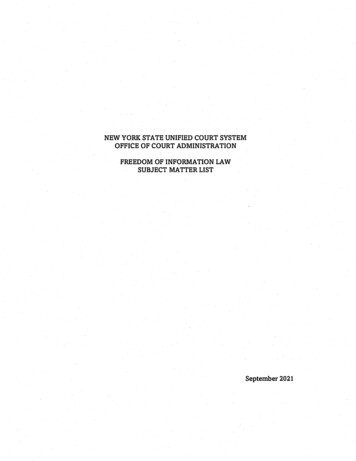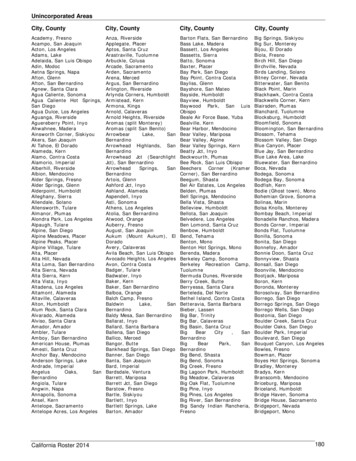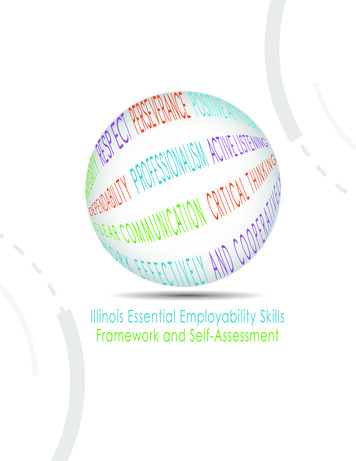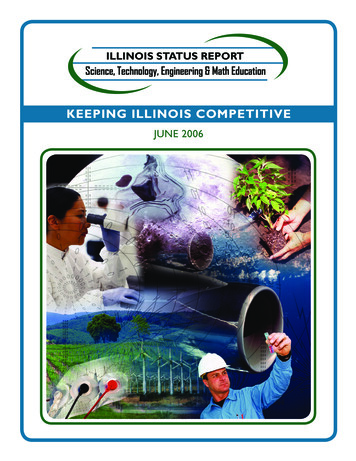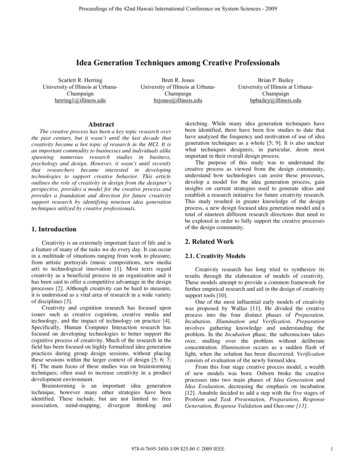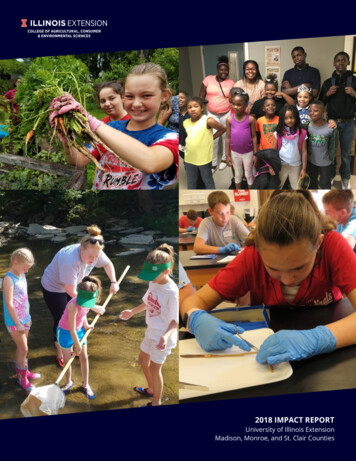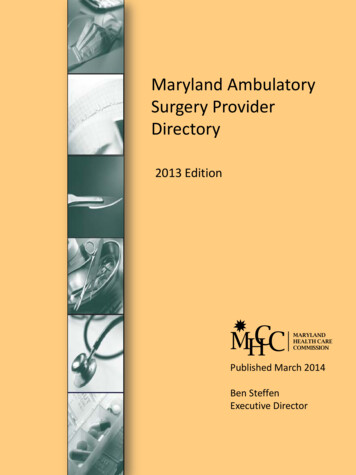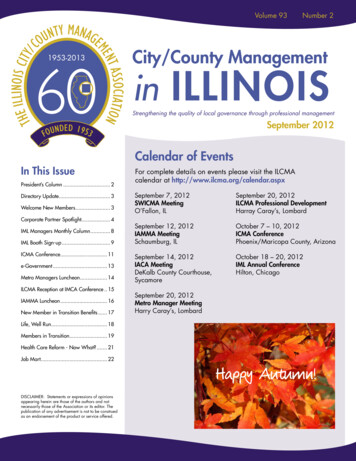
Transcription
Volume 93Number 2City/County Managementin ILLINOISStrengthening the quality of local governance through professional managementSeptember 2012Calendar of EventsIn This IssuePresident’s Column. 2Directory Update. 3Welcome New Members. 3Corporate Partner Spotlight. 4IML Managers Monthly Column. 8IML Booth Sign-up. 9ICMA Conference. 11e-Government. 13Metro Managers Luncheon. 14ILCMA Reception at IMCA Conference. 15IAMMA Luncheon. 16New Member in Transition Benefits. 17For complete details on events please visit the ILCMAcalendar at http://www.ilcma.org/calendar.aspxSeptember 7, 2012SWICMA MeetingO’Fallon, ILSeptember 20, 2012ILCMA Professional DevelopmentHarray Caray’s, LombardSeptember 12, 2012IAMMA MeetingSchaumburg, ILOctober 7 – 10, 2012ICMA ConferencePhoenix/Maricopa County, ArizonaSeptember 14, 2012IACA MeetingDeKalb County Courthouse,SycamoreOctober 18 – 20, 2012IML Annual ConferenceHilton, ChicagoSeptember 20, 2012Metro Manager MeetingHarry Caray’s, LombardLife, Well Run. 18Members in Transition. 19Health Care Reform - Now What?. 21Job Mart. 22Happy Autumn!DISCLAIMER: Statements or expressions of opinionsappearing herein are those of the authors and notnecessarily those of the Association or its editor. Thepublication of any advertisement is not to be construedas an endorsement of the product or service offered.
President’s ColumnKaty Rush, Chair Professional Conduct Committee and VillageAdministrator, WoodridgeEthical Dilemmas“I count him braver who overcomes his desires than him whoconquers his enemies, for the hardest victory is over self.”– AristotleHave you ever been in a situation where you were tempted by anoffer to attend a really great ball game where tickets are hard toscore, join with some powerful folks at a dinner at an expensiverestaurant or free golf opportunity? And the vendor making theoffer was a really nice person and someone you enjoy spendingtime with? You know that there is the gift ban prohibition whichis a legal requirement which we must follow as public employeesand you are aware some communities have gone further to adopta more restrictive ethics code. Your community is not one of thoseso the gift ban is the legal requirement. You have been told thatthese situations will not violate the gift ban (food is okay if eaten ata location/event, the ball game ticket is not worth over 75 andthe golf is less than that threshold as well). You know about theICMA Ethics Code and you wonder if accepting any of these offerswould put you at risk of violating the code which, on an annualbasis, you vow to uphold.guideline is not intended to isolate members from normal socialpractices where gifts among friends, associates and relativesare appropriate for certain occasions.In any situation, there are going to be circumstances that make theseevaluations more clear. Perhaps you are in an RFP process and thevendor offering the ball game tickets will be submitting a proposal.Clearly, you want to stay away from those tickets. Maybe, youare truly long-standing friends with the vendor and don’t have anycourse of business with him today in your municipality. Acceptingthe tickets becomes more of a judgment call. Perhaps the bestcourse of action is to pay for your own ticket and enjoy the event.Or perhaps, it is best to watch the game at home with friends. TheICMA Code of Ethics is not entirely black and white.When you have a question about a situation and need advice, Iencourage members to call Martha Perego at ICMA. She can askstrategic questions that will help you evaluate the situation andkeep in the clear.Resources:http://icma.org/en/icma/knowledge network/documents/kn/Document/100265/ICMA Code of Ethics with GuidelinesThe ball game, dinner and golf situations can be evaluated againstthe following tenets:Tenet 3:“Be dedicated to the highest ideals of honor and integrity in allpublic and personal relationships in order that the member maymerit the respect and confidence of the elected officials, of otherofficials and employees, and of the public.Guidelines:Public confidence. Members should conduct themselves so asto maintain public confidence in their profession, their localgovernment and in their performance of the public trust.Impression of Influence. Members should conduct their officialand personal affairs in such a manner as to give the clearimpression that they cannot be improperly influenced in theperformance of their official duties.Tenet 12:“Seek no favor; believe that personal aggrandizement or profitsecured by confidential information or by misuse of public timeis dishonest.Guidelines:Gifts. Members should not directly or indirectly solicit any gift oraccept or receive any gift—whether it be money, services, loan,travel, entertainment, hospitality, promise, or any other form—under the following circumstances: (1) it could be reasonableinferred or expected that the gift was intended to influence themin the performance of their official duties; or (2) the gift wasintended to serve as a reward for any official action on theirpart.It is important that the prohibition of unsolicited gifts be limitedto circumstances related to improper influence. In de minimussituations, such as meal checks, some modest maximum dollarvalue should be determined by the member as a guideline. The2
Who’s Who Directory UpdatePatrick M. Brennan, the former Highland Park deputy citymanager, is the new village manager for the village ofKenilworth.Kendal Maltas, who has served the village of Northbrook asmanagement analyst since 2009, was promoted to assistantto the village manager in Northbrook.Juliana Maller, formerly the acting city manager in Park Ridge,has been appointed as the new village manager in HanoverPark. Her new contact information is as follows:Village ManagerVillage of Hanover Park2121 West Lake StreetHanover Park, IL 60133Email: jmaller@hpil.orgPhone: 630-823-5610Welcome New Members!T. Luke Banaszak, City of Highland Park, Administrative InternGary Brennan, City of Minonk, City AdministratorSteve Castans, Securitas Security Services USA, IncLarry Doria, Securitas Security Services USA, IncJoel Horn, Whiteside County, County AdministratorJenn Krieher, U.S. Department of Housing & Urban Development,Debt Restructuring SpecialistPhil Modaff, Village of Carol Stream, Director of Public WorksJohn Schwarz, Village of Winfield, Administrative InternScott Williams, City of Collinsville, City ManagerJonathan D. Kindseth has been appointed assistant to the citymanager of Highwood, IL.Hadley J. Skeffington-Vos, management intern, Sterling, IL,since 2011, has been appointed assistant to the city managerof Sterling, IL.Megan Pierce, formerly with Sikich, is the new assistant to thevillage manager in Winnetka. Her new contact information isas follows:Megan PierceAssistant to the Village ManagerVillage of Winnetka510 Green Bay RoadWinnetka, IL 60093Email: MPierce@winnetka.orgPhone: 847-716-3543Cell: 847-650-2773New contact information for Brad Burke:Brad BurkeVillage ManagerVillage of LincolnshireOne Olde Half Day RoadLincolnshire, IL 60069Email: bburke@village.lincolnshire.il.usPhone: 847-913-2335Fax: 847-883-8608www.village.lincolnshire.il.usPhone 800.728.7805 HRGreen.comChicago McHenry Moline New Lenox Rockford Yorkvilledesign construct own operate3
Corporate Partner SpotlightAs part of the “Friends of ILCMA” Corporate Partnership Program, partners atthe highest level get the opportunity to submit a one-page written educational piece in the ILCMA newsletter.The Political Future of PPACABy Gallagher Benefit ServicesThe Patient Protection and Affordable Care Act (“PPACA”) waspassed over two years ago in March 2010. Since its passage,PPACA has faced many challenges including numerous lawsuits,some of which eventually reached the Supreme Court. In Marchof 2012, the Supreme Court heard an extraordinary three days oforal arguments on the constitutionality of the health law’s individualmandate, which requires individuals to purchase health insuranceor pay a penalty. In late June, the Supreme Court handed downits much anticipated ruling, which found the individual mandateconstitutional based on Congress’s taxing authority. However,the Supreme Court’s ruling did not mark an end to all challengesagainst PPACA.On July 11, the House of Representatives voted to repeal PPACA.The vote was 244-185 in favor of repealing the law. FiveDemocrats sided with Republicans in a vote that was generallysplit along party lines. This was the 33rd vote held to limit or repealthe law since Republicans took control of the House in the 2010congressional elections. This is seen as a largely symbolic vote thatwill not have any impact on PPACA, as the Democratic-controlledSenate is not likely to take up the matter.The Republican efforts to repeal PPACA appear to be stalled untilafter the November elections, where control of the Senate and theWhite House will be in play. Should Republicans gain control of theSenate and Mitt Romney wins the Presidency, most political expertsexpect new efforts to repeal PPACA. Even if Republicans fail togain a filibuster-proof 60 seat majority in this year’s elections, theycan challenge the law through other means.Portions of PPACA that affect the budget can be voted on usinga process known as reconciliation. Reconciliation will allow forrepeal of budget-specific parts of the law with a simple 51-votemajority and avoid facing the possibility of a Democratic filibuster.Challenges against other parts of PPACA, including the mandatethat insurance companies cover individuals with pre-existingconditions or that insurance companies cover children until the ageof 26, would not qualify for a reconciliation vote and may still facea filibuster if they are challenged.With more than 70 municipal clients in the state, GallagherBenefit Services will consult with your entity on the following:» Medical» Vision, Dental, Life» Other voluntarybenefits» Long-Term CareGregg R. AlemanArea Senior Vice President630.285.3637gregg aleman@ajg.com» Flexible SpendingAccounts» Healthcare Reform» Compliance» Property & Casualty» Workers Compensation» Municipal Retirement/Executive Consulting» Cooperative Purchasing» HR ConsultingErin N. DuffyAccount Executive630.285.4439erin duffy@ajg.com4
Corporate Partner SpotlightAs part of the “Friends of ILCMA” Corporate Partnership Program, partners atthe highest level get the opportunity to submit a one-page written educational piece in the ILCMA newsletter.Juggling a Multi-Building Capital Plan inOrder to Take Advantage of the Financialand Municipality Branding BenefitsBy Carol Sente, Vice President, FGM ARCHITECTSEveryone enjoys the benefits of a successful capital project, butin the midst of hundreds of decisions about a project’s budget,layout and materials, occasionally a project can frustrate even themost organized of owners. So why the villages of Hoffman Estatesand Glendale Heights would consider a multi-building capitalplan over a very short time span and exponentially increase thedemands on their villages?Often times, facilities are competing for maintenance andfunctional improvements and are dramatically undersized for thecurrent staff and services provided. Due to the cost and laborintensity, capital projects don’t come along every day. So whena municipality’s bonding capacity expands due to the completionof a prior bond repayment, a board might ask, “With bond ratesbeing so favorable and all of our buildings aching for attention,why not address all our capital needs at once?”That is exactly the situation Hoffman Estates found itself in 2001when they designed and built new fire and police stations, a newwater tower and renovated their village hall. Glendale Heights iscurrently in year three of a four-year capital project that includes anew senior center, large police station expansion, aquatic facilityand sports hub expansion/renovation, golf clubhouse renovationand civic center remodeling.Looking to these two municipalities as case studies, what can yourcommunity learn about the benefits of a multi-building capital planand if it is right for you?A municipality can certainly take advantage of financial savingsby rolling all projects into one or two low interest bonds, they canrealize economies of scale by staging projects with some overlapin time schedule, reduce architectural and construction fees byutilizing the same team for multiple projects, and purchase furnitureand appliances for multiple buildings from a single vendor. Beyondthe financial benefit, the second most commonly cited advantageis the municipality is investing in their residents and providingsomething for everyone including professional staff. Often timesnew buildings allow the community to provide new services andamenities for the public’s enjoyment, safety and overall benefit.Furthermore, staff morale and productivity always improves witha building project. “I’m proud we gave our employees the tools,facilities and technology to succeed,” says Village Manager JimNorris.At Hoffman Estates, a confluence of factors spurred their fourproject capital improvement from an explosion of residentialgrowth, a service study to relocate a fire station, annual capitalplanning studies, security concerns for their employees following9/11, officer safety concerns, and a goal to improve servicedelivery to the public. Assistant Village Manager Dan O’Malleyexplains, “Our Village Hall was a former Safeco office buildingwith an open office plan. Transactions were happening at twocounters, neither of which were secure for the protection of ourpatrons and employees. At the beginning, we just moved into thebuilding with minimal changes. As our village grew we neededto make more functional use of our space which allowed betterservice delivery and cross training of staff.”At Glendale Heights, five of the six building projects within theirmulti-building capital project were all located on the civic centercampus which also houses a municipal court. “We had completeda comprehensive space needs study and residents’ survey of whatthey wanted,” says Village Administrator Raquel Becerra. “We donot have a downtown per se and so our centrally located campusserves as a way to create a sense of place for residents. We hada unique opportunity to capitalize on Build America Bonds, andalthough doing all of these projects at once has been a greatchallenge, we are proud of the investment our elected officialshave made into the most visible indicator of community pride andcivic engagement in our community.”The village wanted to change the dated look of their civic centerand sports hub. The first project was an entirely new senior centerand so when SRBL Architects was hired (in January 2012 mergedwith FGM Architects), they worked to give each facility a separateidentity while simultaneously pulling together the entire campus withsimilar materials and color. ‘We wanted to create excitement and asense of place at the campus with helpful signage to direct patronsto the appropriate main entrance depending on the reason for theirvisit,” explained Louise Kowalczyk, FGM’s Project Designer.When asked to provide pearls of wisdom to their peers undertakingsuch an endeavor, municipal managers offered suggestions tostart with a comprehensive facility plan before working on eachindividual project, leave some annual debt service unobligated,regularly communicate the benefits for such a large undertakingto the community and staff, make an early decision about how“green” you want your facilities to be, determine the best timing ofeach building, and consider using the same consultant for multipleprojects. Both villages assigned a project manager to overseethe owner’s responsibilities for each project, and agreed on thebenefit of having one additional person to oversee the “10,000foot” decisions about total budget, overall time schedule, ownercontracts, and village-wide technology.“If you are going to go through change,” summarized Jim Norris,“why not do it all at once? If you are performing your planningprocess regularly, you will find opportunities to bundle yourprojects when advantageous. The transition period was tough butstaff really came together. In the end we were within our budgetand we received the Governor’s Sustainability Award, LEED Gold,and a local environmental award, not to mention the community isbenefitting from enhanced services.”FGM exists toenhancecommunities bycreating qualityenvironments.Since 1945Oak comO’Fallon618.624.33615
Corporate Partner SpotlightAs part of the “Friends of ILCMA” Corporate Partnership Program, partners atthe highest level get the opportunity to submit a one-page written educational piece in the ILCMA newsletter.Improving Water Efficiency and CustomerService at the Madison Water UtilityBy Jim Engelhardt, Wisconsin Business Development Director, Clark Dietz,IncThe Madison Wisconsin Water Utility (MWU) has approximately65,000 accounts and each customer is billed twice a year (sixmonth billing). The city is divided into six meter reading sectionsand a sixth of the customers are billed each month based onreadings taken at six-month intervals. Three full-time meter readersutilize a hand-held electronic device to manually enter readingsfrom a remote register located on the outside of each home orbusiness. The remote register is connected by a wire to the watermeter within the premise and the reading is pulsed from the meterto the outside register. The data contained within the handhelddevice is downloaded each day into the utility’s billing system.Because MWU has always been at the forefront of meterreading (remote devices, hand-held computers), meter testingand replacement, and because their customers have enjoyed lowrates, the six month billing system has been adequate. However,because of changes in metering technology, mandates from thePublic Service Commission, annual rate increases becoming morefrequent, and an increasing awareness of the need to conservewater resources, the MWU wanted to better serve its customersand maximize available water resources.When faced with changing their current meter reading equipmentand technology, the Madison Water Utility took a unique approachto upgrading their system. The utility hired a Clark Dietz, Inc. teamto work with their management and design teams to develop thegoals and objectives for a new meter reading system. These teamswere comprised of diverse members throughout the utility.A new meter reading system impacts all the functional areas of theMWU. Therefore, the management of the utility was consulted tomake sure the new system met the utility goals and objectives. Basedon information obtained, a management plan was developed toidentify the following key components:1. Operational Improvements2. System Improvements3. Customer Relationships4. Project Phasing and Timeline5. Project BudgetOnce the high level management plan was approved, a needsassessment was performed to qualify, document and quantifycurrent tasks to identify what their present process provided andwhat it was not providing. The needs assessment builds from themanagement plan to determine where gaps exist and identifiesproblems that the new meter reading system should solve. Thefollowing key objectives were identified by the project designteams: Upgrade of outdated and soon-to-be obsolete meter readingsystem Change to monthly billing Meet water conservation goals Improve customer service Improve water accountabilityAdditional benefits include: Better and more timely information for customers Early customer plumbing leak detection Improved system leak detection Improved cash flow from necessary rate increases Reduced emissions from meter reading vehicles Facilitate water conservation rate structuresAs the needs assessment progressed, the management plan wasrevised, expanded and developed into the business case for theproject. The business case identified alternative solutions withbenefits achieved based on the identified goals and objectives.The result was the issuance of an RFP for a fixed network AdvancedMetering Infrastructure (AMI) System.Collection of water metering data has gone through severalevolutions including manual, telephone based, radio walk-by, andradio drive-by systems. Now that a fixed network system (AMI)has been developed, the frequent data flow between the meterand the water utility allows delivery of a wide variety of servicesand applications to the utility and their customers. Meter readingsare transmitted several times a day and will be available to thebilling system and staff to assist with customer inquiries. As aresult of timely usage data being available, the AMI system candetect customer plumbing leaks and also allows the utility to moreaccurately and regularly assess water loss throughout the system.As a result of the management plan, needs assessment and businesscase, the MWU determined an AMI system offers many benefits forthe environment, for customers and for the utility. The benefits for theenvironment include customer conservation incentives, water lossreduction, early detection of leaks, and reduced vehicle emissions.The benefits for customers include the ability to manage waterusage, leak detection, accurate and timely bills, and improvedservices. For the water utility, the AMI system offers the ability tobetter serve its customers, improve cash flow, provide for waterconservation, delay capital expenditures, and position itself as anindustry leader.A short list of vendors was determined, interviews and on-sitevisits were conducted and the vendor selection was made withinstallation beginning in August, 2012 and completion by March31, 2013.6
Corporate Partner SpotlightAs part of the “Friends of ILCMA” Corporate Partnership Program, partners atthe highest level get the opportunity to submit a one-page written educational piece in the ILCMA newsletter.New Ideas in Local Government StaffingBy Joellen C. Earl and Heidi VoorheesGovTemps USA, LLCStaffing options in local government today present newopportunities for managers who wish to try different configurationsto deliver services. Traditionally, managers have not enjoyedflexibility when hiring and retaining staff members. Dependingupon the jurisdiction and its geographic location, restrictions onhiring may have hampered a manager’s ability to staff on demandand in a timely and expeditious manner. With the introductionof temporary staffing services geared to serve the needs of localgovernments, the outcome of flexibility in staffing for managers hasbeen achieved. Here are some options to consider when a staffingopportunity is presented:Interim Workers – when vacancies arise, there may be a need tostaff for a short period of time. It typically takes three to six monthsto fill an exempt level position. The use of a qualified interimemployee allows a local government to focus on the recruitmentwhile the interim employee handles the day-to-day functions of theposition. An executive level interim can also assist in identifyingcandidates for the permanent position based on his or her ownnetwork of colleagues.Project based work – temporary staff can be instrumental whencompleting projects. Many available workers have expertisein a particular area as a result of serving for years in the localgovernment profession. Utilizing the expertise of a temporaryworker to complete a complex project can result in efficiency forthe local government as regular staff will not need to developthe expertise to complete the work. Examples include: debtrestructuring and refinancing, municipal electric aggregation,Tax Increment Financing (TIF) administration and capital projectadministration.Phased Retirements – employees who are close to or at retirementage may want to consider a phased retirement. A phased retirementallows an employee to retire and start to collect a pension. Theemployee is then rehired through a temporary staffing firm orother third party and assigned to the jurisdiction on a part-timeor project based arrangement. A phased retirement option is atool that can be used effectively by managers to allow employeeswho many want or need to retire to do so in a manner that honorstheir service to a local government. Moreover, the transfer ofinstitutional knowledge is preserved in a phased retirement asthe former employee is available for a specified period of time tohelp transition this expertise to his or her successor and/or otherdesignated employees.Temp-to-Hire – At times, workers are needed to staff new programsor are being re-hired after layoffs. A temp-to-hire is an optionthat allows a manager the flexibility to determine if the need forthe work is going to be sustained before a permanent offer ofemployment is made. Further, a temp-to-hire is a good option ifa jurisdiction wants to “try out” a worker before retaining him orher permanently. This scenario may be present if the temp-to-hireemployee is transitioning to local government from the privatesector. Utilizing a temp-to-hire can also save a jurisdiction thetime and expense of conducting a full recruitment for an identifiedposition.Outsourced Staff – When demands are seasonal, cyclical ortechnical in nature, a temporary worker can take on a role on anoutsourced basis. Temporary workers can fill seasonal position;positions that are needed when there are spikes in demand (suchas collections and elections) or if there is a part-time technical need,such as plan review. An advantage to a jurisdiction to outsourcethese types of workers is that tax and insurance liabilities andunemployment obligations are avoided.After operating for just over one year, the placements made(expressed in percentages) in local governments are as follows:Type of Placement: Interim, Project, Temp-to-Hire (TTH), Seasonalor OutsourcedTemporary staffing allows managers the flexibility to staff ondemand and as needed. When considering a temporarystaffing firm, the protection from liability for the jurisdiction andthe temporary worker is paramount. A firm should have formalagreements, insurance and pay staff members as W2 employees,rather than 1099 employees. An experienced provider can assistin determining appropriate staffing options for your jurisdiction.(This article appeared in part in the Alliance for Innovation Newsletter,August 2012.)Mentoring – The demographics confirm the shortage of workerswith expertise and time-in-service between the Baby Boomers andGeneration X. As the Generation X-ers work to fill the gap createdby the retirements of the Baby Boomers there is still a need to bringthe next generation, the Millennials, up to a level to take over asthe leaders of local governments. Using temporary workers to actas mentors to those who are now coming up through the ranks isadvantageous to those who wish to impart knowledge and to thoseon the receiving end. The use of mentors allows managers to hireless experienced workers and pair those workers with experiencedindividuals who can provide training and networking opportunities.A mentor can also be retained to complete portions of a positionthat may not be known by the less experienced worker. Oncethe new worker is comfortable completing the basic duties of theposition, the mentor can transition the final more complex piecesthus resulting in a fully trained worker.7
IML Managers Monthly Columninteractive panel discussion about the need for more reforms andthe prospect for their passage.Building Effective Communication between Managers and ElectedOfficialsEffective communication between managers/administrators andelected governing bodies will result in stronger relationshipsand higher levels of trust. Sometimes conflicts can arise betweenelected boards and professional administrators due to a lack ofknowledge on a given issue or process. This session will focus oneffective information-sharing methods, approaches and tools thatprofessional appointed administrators can utilize to keep electedofficials abreast of critical issues and community happenings.Managers Contribute to IML AnnualConference ProgrammingBy Walter Denton, IML Managers Committee, City Administrator, O’FallonAs always, the Illinois Municipal League is holding its AnnualConference on October 18-20 at the beautiful Hilton Chicago. Theconference provides an excellent opportunity to learn about thelatest legislative and legal issues from the state’s foremost experts.Some of those experts are fellow city managers who are speakingon timely topics.Each year, the IML Managers Committee participates in developingsessions for the conference. During this year’s conference foursessions will be offered that should be of great interest to those in themanagement profession. Two sessions involve significant personnelcost issues that municipal management teams must grapple with intheir communities. A third session offers guidance and tips on howto establish and foster effective communication between managersand elected officials. There will also be an opportunity to shareproblems, solutions, and successes during a networking sessiondesigned specifically for managers.Networking for ManagersThis session will provide managers from throughout Illinois withan opportunity to have an open discussion about several topics ofinterest. It’s a great way to share information with colleagues.The IML Managers Committee strongly encourages yourparticipation in the 2012 IML Annual Conference! Interestedparties can register for the entire conference package at a costof 250, or register f
Calendar of Events September 7, 2012 SWICMA Meeting O'Fallon, IL September 12, 2012 IAMMA Meeting . course of action is to pay for your own ticket and enjoy the event. Or perhaps, it is best to watch the game at home with friends. The . Securitas Security Services USA, Inc Larry Doria, Securitas Security Services USA, Inc .
